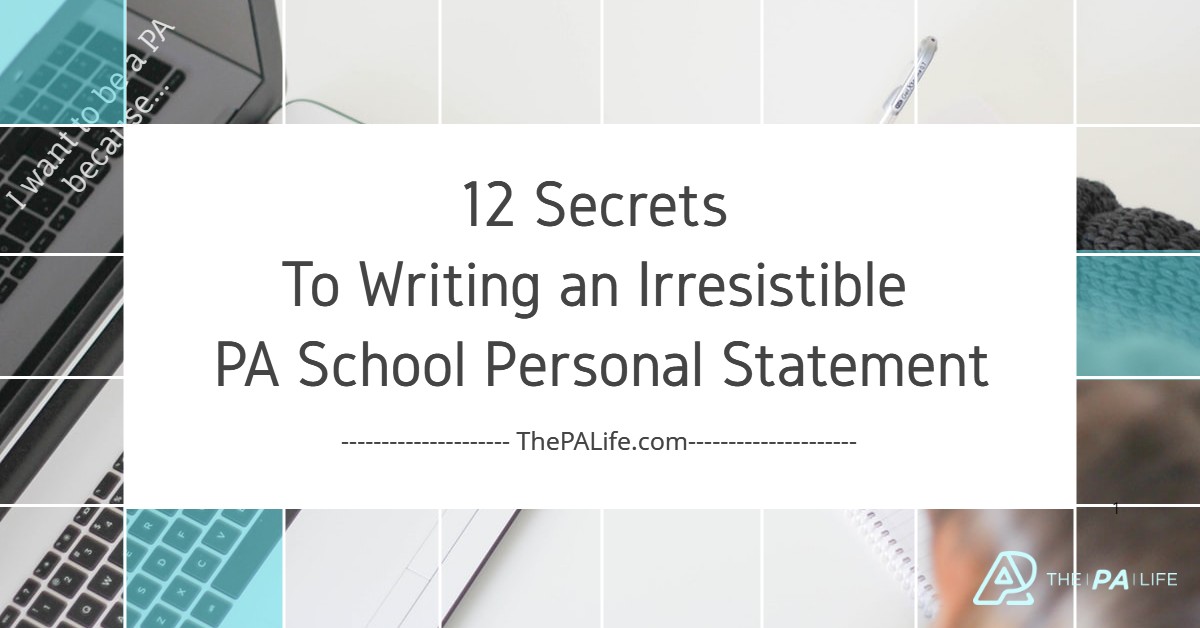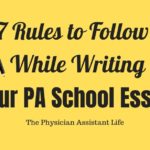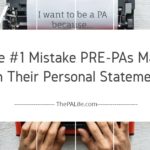
In our book "How to write your PA School personal statement," we interviewed twelve PA school administrators from twelve top-ranking PA programs across the country in search of answers to a simple question:
What do PA school administrators want to see in your PA school essay?
The results of this search, summarized in the first chapter of our book, were eye-opening.
Here are 12 time-tested (and admission director approved) PA school personal statement success secrets based on our PA school admissions interviews.
PA School Admissions Directors Share These 12 Secrets:
#1. First Things First
Secret 1: Know your audience - know the program(s) you are applying to, and what they are looking for in an applicant
- Research the programs in-depth, go to open houses if possible, call the programs, and speak with admissions personnel directly, follow their Facebook, Twitter, and Linked in feeds.
- You wouldn't want to show up on your first date with a handful of geraniums if your partner is allergic to flowers.
Exercise:
Become an expert of your preferred program(s)
- Start at the program's website using our free perfect PA program picker tool, the paschoolfinder website or the PAEA Program directory. "Like" the program on Facebook so you will receive automatic updates from their news feed.
- Next, subscribe to the program's Twitter feed and/or LinkedIn page. This may seem like an unnecessary step, but you will be surprised just how much you can learn about a program by paying attention to its social media feeds.
- Use this info to identify potential contacts in the PA program. Send them a personal message or ask them a question. Current students and graduates love to talk about their alma mater and can be a great resource.
- Contact the program by telephone and ask specifically about program open houses.
- If you are feeling up to the task, contact a faculty member through LinkedIn, and ask program-specific questions.
By the time you sit down to write your essay (and eventually, when you have your interview), you may have a personal connection with PA School faculty.
#2. It was a dark and stormy night in the back of the ambulance
Secret 2: Cut the Drama

Universally, interviewees mentioned the use of drama in essays, and not in a positive way.
- Go for the heart, not the drama
- If your personal statement is superficial, you have a problem
Exercise:
Read the first sentence of your essay aloud. Does it sound like an episode on a soap opera? Take a look at your opening paragraph. Watch for words like "suddenly," "screamed," "blared," and "shocking." Eliminate those and any other words that sound like an exclamation point. Your goal is to tell your story coolly and calmly, the way you'd want a PA to act if you were the patient.
#3. When I was 10, I had my tonsils removed
Secret 3: Avoid first-person family stories and focus on real patients
- The whole point of the personal statement is to educate admissions personnel about the subjective factors that grades, and test scores can't reveal.
- Avoid first-person family stories and focus on real patients.
Exercise:
If you open your essay with a personal experience (and that's okay to do), how long is the paragraph? If it's more than three or four sentences, find a place to eliminate some of the information.
#4. I have a passion for serving
Secret 4: Platitudes waste space
- "Common platitudes like 'I want to help people' aren't useful. We want people who can communicate with patients, so write about those experiences."
- You wouldn't be applying to PA school if you didn't have a passion/calling/desire for the profession. Generalizations don't help admissions personnel discover the factors that make you stand apart from someone else with similar grades and experience.
- "The writer needs to remember we get 1,000's of applications, so the essay needs to be unique enough to catch an eye. It's important to highlight why your experiences would make you a great PA."
- Often those with healthcare experience offer too little insight into what they've gained from their work. We want to know why those experiences are important.
- This is the opportunity to express how you connect with patients on a human level. It's the subjective part of the application – the part that grades and work history don't explain.
- You should include something about personal strengths.
Exercise:
- Write about two or three experiences that prove "I want to help people."
- Now briefly explain what insights you gained from these experiences.
- Describe how you developed or used your personal strengths as a result of these experiences.
#5. What? You could have been a doctor!
Secret 5: You need to know why you've targeted this profession and not another healthcare-related job

The essay needs to show some level of maturity and understanding of the PA led team. Why does the profession apply to you?
- Why have you chosen PA school and not medical or nursing school?
- What happened in your journey to bring you to this decision? If you want me to understand how you reached this point in your life tells me about your motivations.
Exercise:
Write an answer to the following questions:
- Why does the PA profession apply to you?
- Why have you chosen PA school over medical school or nursing school?
- What happened in your journey to bring you to this decision?
Make sure to read:
#6. So you volunteered at a food pantry
Secret 6: If you volunteered, tell us how that experience impacted you. It doesn't have to be a healthcare-related situation
- If helping at a women's shelter changed you in a way that will make you a better PA, talk about it.
- You don't need to leave the country for a mission for volunteer work to matter.
- Tell us about community service, especially as it relates to our mission of serving diverse and underserved populations.
- If your community service work provides the drive for you to apply, tell us about it.
- If you worked with underserved populations, tell how that impacted your perception of health care.
Exercise:
Write three sentences about your volunteer experiences. Tell me what you learned, such as how to relate to people of different ethnicities or those who live in poverty or have mental health issues. Maybe you developed leadership or organizational skills while volunteering or developed your skills of patience, compassion, or ability to listen.
Yes, volunteer work matters, but if you don't share what you've gained from the experience, it won't help your essay.
#7. It's not only what you want
Secret 7: Go beyond the website to find out about our program
- I'll want to know what you can contribute to our program and your future patients
- Think about what we want for the end product – passionate, empathetic, smart PAs. What personal skills do you have that meet those criteria?
- Have you researched us? Go beyond the website to find out about our program
- Applicants should describe why they fit into our program.
- Clinical hands-on training. Applicants should describe the skills they already have in that area.
Exercise:
It's time to do some research on your potential program.
Make a list of the top 5-10 PA schools you would like to apply to. Include the website and contact information.
Now it's time to do some reconnaissance.
Start at the program website, then contact the program in person.
Template: My name is _____________ I am very interested in applying to _____________ and I want to make sure that I am an excellent fit for your program. I have reviewed your website and social media posts, but I want to ensure I haven't missed anything. Is there someone I can speak with to learn more about your expectations of candidates for your program?
Single Edit One-on-one Service Supplemental Essays
#8. I bombed my junior year and other anomalies
Secret 8: The personal statement offers a unique opportunity to explain why you've had bumps in the road
- Everyone wants to hear the explanation, but not in too much detail. Interviewees wanted to know what led to the problem – perhaps the death of a parent, not about childhood incidents such as abuse or neglect.
- If there are weaknesses in your application, don't assume anyone will know why. If you haven't done volunteer work, maybe it's because you're economically disadvantaged and need to work full time. Use part of the essay to explain that.
- If you have a dip in grades, explain what happened in a brief sentence or two. You have to find a balance between being too personal and not personal enough.
- Show that you take ownership of your weaknesses.
- Address academic difficulties. Explain what was happening at the time. Focus on your trajectory of academic improvement
Exercise:
It's time to find anomalies and make a list of them (below are some common examples):
- Grades
- Lack of medical experience
- Lack of shadowing
- References
Now in a sentence or two, explain each. Did your grades drop because you were taking care of an ill family member?
Then write the positive things that have happened to overcome the negative. Have your grades risen now that your family member has recovered? Maybe your non-medical-related work experience helped you develop skills that you'll need as a PA?
Make sure to read:
#9. This isn't your first rodeo
Secret 9: If you are reapplying, it's important to explain what's different this time

Don't hand in the same application. I love it when applicants say, 'These are the things I did to strengthen my skills.' It shows maturity and ownership.
Exercise:
If you are reapplying, what have you done to strengthen your skills? List them:
- Increased work experience
- More shadowing
- Improved GPA or classwork
Make sure to read:
#10. Getting from A-Z: Connect the dots
Secret 10: Make sure you cover all your relevant experiences and link them by the time you reach the conclusion
- The structure is fundamental to your essay. It's easiest to follow a story written in chronological order.
- Make sure the essay is as concise as possible, with no gaps in time.
- Use a hook, but don't spend too much time on it. The hook is the skeleton to hang material on. If you have a passion for running, link that dedication to your work ethic.
- Don't spend three-quarters of the essay on one experience. We would rather learn about everything you've done – shadowing, volunteer work, classwork – things you have control over.
Exercise:
Write your life story: In no more than one page, write your life story. Explain what brought you to the point of applying to PA school. Hit the major experiences, influences, and education. Write it in chronological order.
Think of a hook: Here is an example from a successful candidate. "My desire to become a physician assistant came to me in a most unlikely place, a ballroom dance studio."
#11. Writing is rewriting
Secret 11: The personal statement should be polished, but written by you
- You've gone over and over your essay, but that's not enough. Every interviewee recommends having several others read it for grammar and spelling errors as well as structure and cohesion.
- Make sure your essay is yours.
Exercise:
Give your essay to at least three people who you trust to give an unbiased opinion. Have them write out their recommendations.
Make a list of the recommended changes and incorporate those you feel are appropriate in your essay. If all three agree about a point, that's feedback to heed.
#12. Little things are big
Secret 12: Spelling and grammar errors are unacceptable
- Yes, you've checked your essay for mistakes, but they happen frequently enough for every interview to mention it.
- It's a reflection of your capabilities and education.
- There is no excuse for errors in spelling and grammar.
- Errors are immediate red flags.
- Get the title of the profession right: If you write physician's assistant (it should be physician assistant), it triggers concern. It tells us you don't really understand what the profession is about.
- BE SURE TO FOLLOW THE INSTRUCTIONS. The first question on our applicant self-assessment form is, 'Have you followed the instructions?' It's amazing how many people don't.
Exercise:
Do a spell and grammar check (I highly recommend Grammarly), but don't rely on it. Read your essay word for word to ensure everything is correct.
Double-check the application instructions and make sure you've followed them exactly. Don't rely on what someone else tells you they are.
Make sure to read:
Download Your Free Copy of Our How to Write Your PA School Essay Workbook
Did you like this post? We created a free workbook outlining this 12-step, alcohol-free 🙂 program to help you craft a personal statement that the admissions directors will be dying to read. Just enter your email address below, so we know where to send your free copy.
View all posts in this series
- How to Write the Perfect Physician Assistant School Application Essay
- The Physician Assistant Essay and Personal Statement Collaborative
- Do You Recognize These 7 Common Mistakes in Your Personal Statement?
- 7 Essays in 7 Days: PA Personal Statement Workshop: Essay 1, “A PA Changed My Life”
- PA Personal Statement Workshop: Essay 2, “I Want to Move Towards the Forefront of Patient Care”
- PA Personal Statement Workshop: Essay 3, “She Smiled, Said “Gracias!” and Gave me a Big Hug”
- PA Personal Statement Workshop: Essay 4, “I Have Gained so Much Experience by Working With Patients”
- PA Personal Statement Workshop: Essay 5, “Then Reach, my Son, and Lift Your People up With You”
- PA Personal Statement Workshop: Essay 6, “That First Day in Surgery was the First Day of the Rest of my Life”
- PA Personal Statement Workshop: Essay 7, “I Want to Take People From Dying to Living, I Want to Get Them Down From the Cliff.”
- Physician Assistant Personal Statement Workshop: “To say I was an accident-prone child is an understatement”
- 9 Simple Steps to Avoid Silly Spelling and Grammar Goofs in Your PA School Personel Statement
- 5 Tips to Get you Started on Your Personal Essay (and why you should do it now)
- How to Write Your Physician Assistant Personal Statement The Book!
- How to Write “Physician Assistant” The Definitive PA Grammar Guide
- 101 PA School Admissions Essays: The Book!
- 5 Things I’ve Learned Going Into My Fourth Physician Assistant Application Cycle
- 7 Tips for Addressing Shortcomings in Your PA School Personal Statement
- The #1 Mistake PRE-PAs Make on Their Personal Statement
- The Ultimate PA School Personal Statement Starter Kit
- The Ultimate Guide to CASPA Character and Space Limits
- 10 Questions Every PA School Personal Statement Must Answer
- 5 PA School Essays That Got These Pre-PAs Accepted Into PA School
- 7 Questions to Ask Yourself While Writing Your PA School Personal Statement
- 101 PA School Applicants Answer: What’s Your Greatest Strength?
- 12 Secrets to Writing an Irresistible PA School Personal Statement
- 7 Rules You Must Follow While Writing Your PA School Essay
- You Have 625 Words and 2.5 Minutes to Get Into PA School: Use Them Wisely
- What’s Your #1 Personal Statement Struggle?
- 31 (NEW) CASPA PA School Personal Statement Examples
- How to Prepare for Your PA School Interview Day Essay
- Should You Write Physician Associate or Physician Assistant on Your PA School Essay?
- Meet the World’s Sexiest PA School Applicants
- PA School Reapplicants: How to Rewrite Your PA School Essay for Guaranteed Success
- How to Write a Personal Statement Intro that Readers Want to Read
- PA School Reapplicant Personal Statement Checklist
- How to Deal with Bad News in Your Personal Statement
- Inside Out: How to use Pixar’s Rules of Storytelling to Improve your PA Personal Statement
- Ratatouille: A Pixar Recipe for PA School Personal Statement Success
- Personal Statement Panel Review (Replay)
- Mind Mapping: A Tool for Personal Statements, Supplemental Essays, and Interviews
- Start at the End: Advice for your PA School Personal Statement
















Leave a Reply